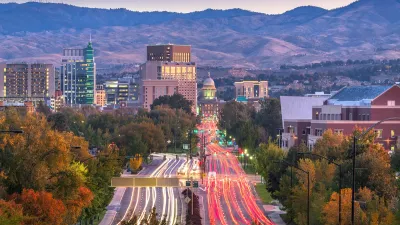We're likely witnessing the beginning of the slow decline of a technology that's defined our transportation and land use policies for a century - the private car. Emily Badger explains how unnoticed events produce socio-technical transitions.
“We’re probably closer to the end of the automobility era than we are to its beginning,” says Maurie Cohen, an associate professor in the Department of Chemistry and Environmental Science at the New Jersey Institute of Technology. “If we’re 100 years into the automobile era, it seems pretty inconceivable that the car as we know it is going to be around for another 100 years.”
"Sitting in the present, automobiles are so embedded in society that it’s hard to envision any future without them," writes Badger. "But no technology – no matter how essential it seems in its own era – is ever permanent. Consider, just to borrow some examples from transportation history, the sailboat, the steamship, the canal system, the carriage, and the streetcar."
“There’s not going to be a cataclysmic moment,” Cohen says of what’s coming for the car. “Like any other technology that outlives its usefulness, it just sort of disappears into the background and we slowly forget about it.”
FULL STORY: What the Steamship and the Landline Can Tell Us About the Decline of the Private Car

Alabama: Trump Terminates Settlements for Black Communities Harmed By Raw Sewage
Trump deemed the landmark civil rights agreement “illegal DEI and environmental justice policy.”

Planetizen Federal Action Tracker
A weekly monitor of how Trump’s orders and actions are impacting planners and planning in America.

The 120 Year Old Tiny Home Villages That Sheltered San Francisco’s Earthquake Refugees
More than a century ago, San Francisco mobilized to house thousands of residents displaced by the 1906 earthquake. Could their strategy offer a model for the present?

In Both Crashes and Crime, Public Transportation is Far Safer than Driving
Contrary to popular assumptions, public transportation has far lower crash and crime rates than automobile travel. For safer communities, improve and encourage transit travel.

Report: Zoning Reforms Should Complement Nashville’s Ambitious Transit Plan
Without reform, restrictive zoning codes will limit the impact of the city’s planned transit expansion and could exclude some of the residents who depend on transit the most.

Judge Orders Release of Frozen IRA, IIJA Funding
The decision is a victory for environmental groups who charged that freezing funds for critical infrastructure and disaster response programs caused “real and irreparable harm” to communities.
Urban Design for Planners 1: Software Tools
This six-course series explores essential urban design concepts using open source software and equips planners with the tools they need to participate fully in the urban design process.
Planning for Universal Design
Learn the tools for implementing Universal Design in planning regulations.
Clanton & Associates, Inc.
Jessamine County Fiscal Court
Institute for Housing and Urban Development Studies (IHS)
City of Grandview
Harvard GSD Executive Education
Toledo-Lucas County Plan Commissions
Salt Lake City
NYU Wagner Graduate School of Public Service





























